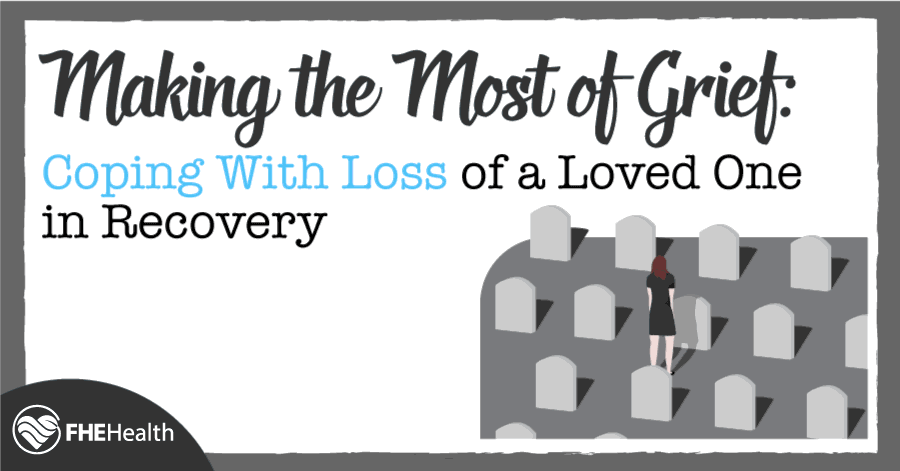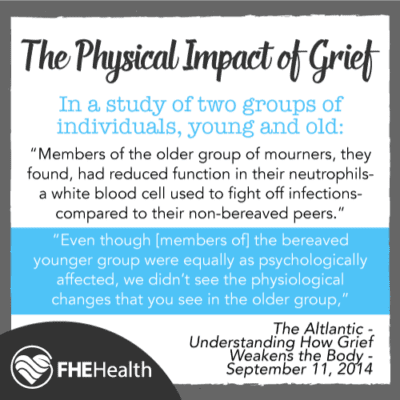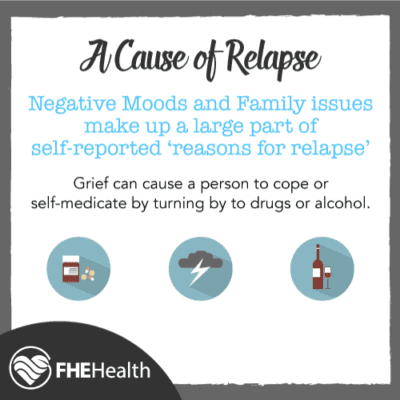
|
|
Recovery from addiction, no matter what shape it takes or the stage that it’s in, is an emotionally taxing time for anyone. Being able to resist the strongest temptations and make sweeping changes to your life isn’t easily done.
The difficulty of recovery is amplified, however, when grief is added. Losing a loved one can bring great sadness for anyone, but for someone in recovery, it can be an earth-shaking event, one that’s almost certain to lead to relapse and starting over from square one.
How Grief Affects the Average Person
 Grief over the loss of a loved one is one of the most intense emotions a person can experience. We’ve long known this, but a study published in Ageing and Immunity emphasizes the reality.
Grief over the loss of a loved one is one of the most intense emotions a person can experience. We’ve long known this, but a study published in Ageing and Immunity emphasizes the reality.
Scientists have long observed a phenomenon in spouses involved in long-term marriages. When one spouse dies, the other one usually isn’t far behind. Researchers from the University of Birmingham set out to answer the question of whether this is just a coincidence or whether there’s actual science to support a degenerative effect of bereavement.
The study found that grief had a physical as well as a mental effect on couples, mostly at advanced ages. It actually weakens the immune system.
Grief: A Connected Pathway with Addiction
When we consider the ways in which grief affects those in recovery, we have to mention the role that grief plays in a complex connection with the mental health of those experiencing it.
Grief can prompt a person to cope by using drugs or alcohol, whether they had previous substance abuse issues or not. One reason is depression. Grief is well-known to cause short- or long-term depression, even in people without a genetic or behavioral tendency towards the condition.
 Many depressed people turn towards extreme coping methods, like drug and alcohol use and abuse, creating more addicts over time.
Many depressed people turn towards extreme coping methods, like drug and alcohol use and abuse, creating more addicts over time.
No matter what prompted a substance use disorder, it’s likely that most addicts have grown accustomed to using their addiction as a coping method, a way to dull the pain and other negative emotions of events or circumstances in their lives from which they’re looking to escape. This is why grief can be such a powerful trigger for addicts. When extremely negative emotions arise, the natural response is to slip back into old coping mechanisms.
Interestingly, studies have shown that while addicts may get the detachment from reality they’re looking for out of drug and alcohol abuse to cope with grief, these coping methods also prolong the negative feelings and depression that come with tragic events. In 1989, a study concerning the mental status of those affected by a major earthquake found that subjects who resorted to heavy drinking to cope remained depressed longer than subjects who didn’t.
What Happens When a Person Loses a Loved One While In Recovery?
Recovery is difficult, especially in the early stages, and recovering addicts can be emotionally fragile. This happens for a few reasons:
- The loss of a major habit: Especially in long-term addiction, the compulsion to use is more than just a strong urge. It’s a major part of a person’s life, and on a small scale, it’s almost like the addict is grieving the loss of themselves in the earliest stages of recovery. Consider the effect of more grief on top of this and it’s easy to see why addicts are especially susceptible to loss during this sensitive time.
- Coping with change: Recovery is associated with major change. As a person puts negative behaviors behind them, the change comes in the form of growth, but it’s a change into something new and unfamiliar nonetheless. In some cases, having to turn your back on family or friends who aren’t positive influences to your sobriety may feel like you’ve lost them, which can spark grief in and of itself.
- Frustration and temptation: It’s not uncommon for recovering addicts to struggle with the urge to use or the frustration and hopelessness of feeling like they’re never going to succeed. Because of these feelings, a person in recovery can be in a very delicate emotional state, unprepared to deal with potential grief from the loss of a loved one.
How Do You Manage Grief in Recovery?
We’ll start with a blunt statement: Losing a loved one while in recovery can be one of the most stressful and trying times of your life. It will be anything but easy, but coping is possible.
It’s important to remember to try to resist the types of negative feelings that would’ve driven you to use drugs in the past. Here are a few ways addicts deal with losing loved ones in recovery:
Lean on a Support Community
One of the many benefits of rehab in a facility that offers care and support at various levels is the type of positive community you have access to. Whether it’s an alumni community or a 12-step support group, that’s what your sober community is there for, providing support through the hard times and helping you stay on your path to recovery.
Face Your Emotions
Grief has a profound effect on recovery, for someone who has spent years trying to escape, it can be especially jarring when you have to face the full, raw emotion that comes with loss.
This is part of the origin of the intense urge to relapse in the face of grief. Most addicts have used drugs or alcohol to escape negative circumstances and feelings, so this is their natural response to loss.
It’s important to remind yourself that this won’t be constructive, that reverting back to old ways will also revert you back to square one of your recovery.
Use Your Grief as an Opportunity
When someone says, “Make the most of your loss,” it can be puzzling, but there are constructive ways to spin grief. During your recovery, you’ve developed tools to overcome obstacles that may arise and tempt you to relapse. This is one of those obstacles, and while it may be painful, it can be used as an opportunity to put your positive coping skills into action.
Grief is difficult for anyone, but especially so for people in recovery from addiction. While it can be enormously hard to cope, the right rehab programs can give you the tools to use loss as an opportunity for personal growth during recovery. If you or a loved one are struggling with addiction, contact FHE Health today and learn how you can get lifelong support.






